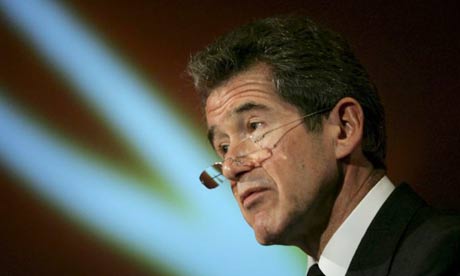
Candid books about business life are rare. BP's Lord Browne deserves praise for making a brave start.
His memoir, published yesterday, explores territory of a deeply personal nature. From the death of his mother, to the intolerable strains of life in the public gaze, this extremely private man is prepared to return to some painful periods in his life with refreshing honesty.
Undoubtedly the toughest few weeks came around Christmas 2006 when three events co-incided with devastating timing. First was a report commissioned by Browne himself into what he calls 'the saddest and probably worst day of his working life': the deaths of 15 BP employees in a refinery explosion at Texas City. Unusually for a corporate investigation, it concluded BP's senior management was directly to blame (for allowing a lax safety culture to develop) – forever tarnishing his personal reputation in the company's most important market.
To make matters worse, it was all the ammunition that his enemies inside the company needed to force him out after a bitter year-long struggle with BP's chairman Peter Sutherland. Though the board had announced his retirement date, Browne conceded he "did not know how to leave" until these twin pressures made it clear it was time.
But what few people knew back then was that Browne had also just received another body blow: a blackmail letter from his former lover, who was threatening to go public about their four-year relationship and a sexuality he had spent his professional life trying to hide.
What followed saw the British press at its worst, and a personal tragedy of Shakespearean dimension unfold as Browne chose to make a false statement to the court about how he had met the man (via an escort agency). The ill-fated attempt to prevent the Mail on Sunday from publishing backfired and BP's chief executive chose to go immediately rather than wait out his last few months in office.
As a reminder of the homophobia that persists in corporate (and media) life, the tale takes some beating. There remain few openly gay business leaders in Britain, although as Browne acknowledges, this is partly generational: men who felt it necessary to hide their personal life during less liberal decades understandably see little need to discuss it in public now.
Yet the focus on this episode during moving interviews in The Times and on Radio Four to promote the book, risks doing exactly what Browne fought so hard against: letting his sexuality eclipse his professional record. What feels uncomfortably absent this week is context. Just as we over-simplified his career on the way up, we risk over-glorifying his descent.
Companies, like all powerful institutions, seethe with far more nuanced internal politics. Readers of the BP tea leaves should note two things about this book: there is no mention by name of Browne's Irish nemesis, Sutherland, and preview copies went to the media before they went to the current management.
There is no reason why Browne should detail his professional demise, any more than we have any right to expect him to discuss his sexuality in public, but the circumstances of his departure were even more intimately tied-up with a very public event: the worst US industrial accident for 20 years. It would be wrong to let one event in this notoriously-risky industry overshadow a lifetime at the top of British business, but it would also be wrong to remember his departure as nothing but a "kiss and tell" tragedy.
Oddly, while Browne is now willing to talk about the 'young Canadian' who betrayed him, he remains unwilling to mention the 'old Irishman' who sacked him.

